The Rules of Investing
The Rules of Investing is one of Australia’s longest-running business podcasts, providing investors with unparalleled access to the ideas and insights of Australia’s leading fund managers, economists and industry experts. Learn how the industry’s best invest, with the help of Livewire’s James Marlay and Chris Conway. Whether you’re new to investing or a seasoned professional, this podcast is for you. New episodes are released every second Friday, available on Livewire Markets, Spotify, Apple Podcasts, and YouTube.
The Rules of Investing is one of Australia’s longest-running business podcasts, providing investors with unparalleled access to the ideas and insights of Australia’s leading fund managers, economists and industry experts. Learn how the industry’s best invest, with the help of Livewire’s James Marlay and Chris Conway. Whether you’re new to investing or a seasoned professional, this podcast is for you. New episodes are released every second Friday, available on Livewire Markets, Spotify, Apple Podcasts, and YouTube.
Episodes
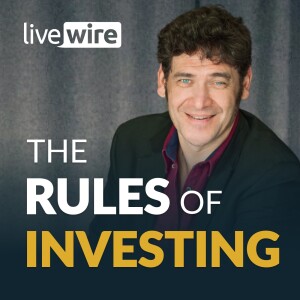
Friday May 31, 2024
Rudi: AI is the end of investing as we know it
Friday May 31, 2024
Friday May 31, 2024
While "survival of the fittest" certainly applies to the Earth's abundance of flora and fauna, it may be time for investors to take a page out of Darwin's book.
That's according to FNArena's Rudi Filapek-Vandyck, who believes the market has irreversibly changed since 2014 - as has the way investors should value stocks.
In this episode, Rudi outlines why he believes technological innovation will transform the market as we know it. He also discusses some of his favourite ASX-listed stocks to play the AI theme, the importance of quality companies in today's markets, and what it takes for a company to be an all-weather stock.
Note: This episode was recorded on Wednesday 29 May 2024. Note #2: Ally was today years old when she learnt what R.E.M. is, she apologises for any harm her ignorance may have caused hardcore fans. If it's any excuse, the song was released seven years before she was born.
https://www.livewiremarkets.com/wires/rudi-ai-is-the-end-of-investing-as-we-know-it
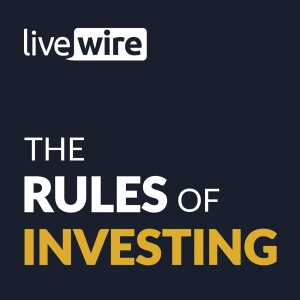
Thursday May 23, 2024
The investment secrets of Australia's billionaires
Thursday May 23, 2024
Thursday May 23, 2024
There seems to be no stopping Australia's ultra-wealthy, with the number of billionaires down under growing by 14.4% over the past 12 months, to a record 159 people. For some context, in 2020, this number was 117, according to The Australian.
While it's wonderful to daydream about what you would buy or do with a few billion dollars, the true secret success of the ultra-wealthy is their ability to stay that way. After all, how many stories have you read of lottery winners squandering their newfound wealth just a few short years later?
So, how do the other half continue to grow their wealth?
To find out, Livewire sat down with MRB House's Peter Magee and Walsh Capital's Louise Walsh for their insights into how Australia's ultra-wealthy invest as part of Livewire's Undiscovered Funds Series.
They share their tips and tricks for identifying "exceptional" funds, outline the factors that are important to their processes, share what to do when a fund isn't performing as expected, and name one recently launched fund that has impressed in recent years.
Note: This interview was recorded on Wednesday 15 May 2024.
https://www.livewiremarkets.com/wires/the-investment-secrets-of-australia-s-billionaires
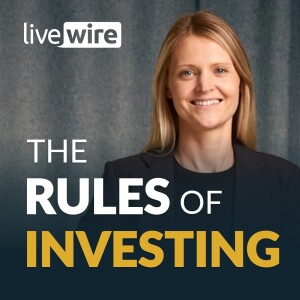
Saturday May 18, 2024
700+ meetings each year: How WAM Global uncovers under-the-radar stocks
Saturday May 18, 2024
Saturday May 18, 2024
In investing, just as in love, trust is everything - and without it, you really don't have anything at all.
It's for this reason that the Wilson Asset Management global equities team meets with more than 700 management teams across the world each year - including in the US, Japan, and Europe. In addition, they also meet with competitors and suppliers, as well as talk to current and past employees and industry experts.
According to WAM Global (ASX: WGB) lead portfolio manager Catriona Burns, the team does this because trust in a company's management team is paramount.
"Have they hit their targets? Have they done what they said? If we have any doubts on that trust factor, for us, that's completely a non-negotiable and we won't invest," she says.
Burns is reading between the lines, and looking beneath the surface for red flags. And while management teams selling stock, poor track records and value-destructive deals can certainly be warning signs, she argues that alignment - and the lack thereof - can often be far more telling for the future direction of a company's share price.
"Incentives drive outcomes... I can't tell you how many times I have seen incentives for management based on earnings per share growth," she says.
"Companies just chase acquisitions to meet earnings growth without thinking about the returns that are being generated on the dollars spent. That happens time and time again and is a massive red flag."
In this episode of The Rules of Investing, Burns takes listeners through some of the companies that have managed to pass her filters, as well as why catalysts are so important for investors with a penchant for value.
She also outlines why the listed investment company's growing annual yields won't be slowing over the next five years, what it's actually like on the ground in the US right now, as well as what the US election at the end of the year could mean for markets.
Note: This interview was recorded on Tuesday 14 May 2024.
https://www.livewiremarkets.com/wires/700-meetings-each-year-how-wam-global-uncovers-under-the-radar-stocks
0:00 - Intro
1:21 - What it is actually like on the ground in the US
2:14 - Catriona Burns' outlook on rates and inflation
3:26 - The WAM Global (ASX: WGB) investment process (and the importance of trust)
8:09 - Alignment is everything + why CTS Eventim (ETR: EVD) is a good example
9:35 - Artificial intelligence and where Catriona is invested here
13:38 - On not owning NVIDIA (NASDAQ: NVDA)
14:41 - Why she's overweight financials and healthcare
16:47 - Picks + shovels approach versus drug developers in healthcare
18:18 - Stock with major catalysts on the horizon: CTS Eventim (ETR: EVD) and Quanta Services (NYSE: PWR)
20:01 - Why catalysts are so important
21:27 - The sustainability of WAM Global's yields + franking credits
22:46 - How to think about performance
24:33 - Why Catriona is bullish on the outlook for global small and mid caps
25:42 - One thing investors are getting wrong about today's markets
26:51 - US politics + what a Trump win would mean for markets
29:10 - A story of a loss from Catriona's career and what she has learnt from this
31:19 - One stock that Catriona would buy and hold if the market were to close for the next five years: Intercontinental Exchange (NYSE: ICE)
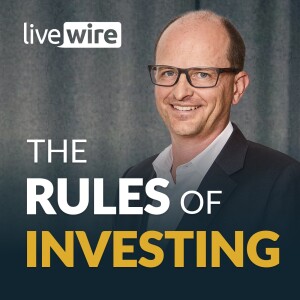
Saturday May 11, 2024
Chris Stott’s 5 high conviction stock ideas for the new bull market
Saturday May 11, 2024
Saturday May 11, 2024
Time flies when you’re having fun! While the last five years have had plenty of ups and downs, they haven’t dented the enthusiasm and passion of small-cap fund manager Chris Stott from 1851 Capital.
Stott launched 1851 Capital in 2020, just before COVID-19 hit, wreaking havoc on the market and his portfolio. Since then, Stott has comfortably beaten his small-cap benchmark, growing the fund’s initial capital of $80 million to almost $500 million through a combination of inflows and capital growth.
Whilst there was some exuberance after the initial shock of the pandemic, the past few years have been far more challenging for small-caps investors.
“Over the past four and half years, the small-cap index has returned 3% per annum. If you look at the 30 years before we launched the fund, it was 10% per annum. So quite a significant underperformance, quite dismal in fact,” Stott says.
However, late October 2023 marked a turning point and the small-cap index has recently entered a technical bull market, having rallied more than 20%.
So where to from here and which companies does Stott believe can sustain the early track record that 1851 Capital has established?
In this episode of The Rules of Investing, Stott shares his lessons from starting a new fund, why he believes the bull run in small caps can continue and five of the stocks he is backing to deliver market-beating returns.
For those of you with a good memory, Stott was last on the podcast in June 2020, when he tipped NextDC (ASX: NXT) as the one stock he would hold if markets were to close for the next five years. Shares in NextDC have gained more than 75% over that time, and the company is now in the ASX100, forcing Stott to exit his position. Naturally, we’ve asked him for a fresh idea.
Note: This episode was recorded on Wednesday 8 May 2024.
https://www.livewiremarkets.com/wires/chris-stott-s-5-high-conviction-stock-ideas-for-the-new-bull-market

Friday Apr 12, 2024
Christopher Joye: No margin for error for risk junkies craving rate cuts
Friday Apr 12, 2024
Friday Apr 12, 2024
The past six months have been golden for investors, with everything from equities to gold and even Bitcoin enjoying stellar runs. And if risk assets are not your bag, then there have been juicy yields on offer across a range of cash and fixed-income asset classes.
Animal spirits woke from their slumber in late October 2023 when the Fed effectively claimed victory in the fight against inflation. Markets have been led to believe that rate cuts are a forgone conclusion in the year ahead, and participants have been piling into risk assets accordingly.
Christopher Joye, portfolio manager and chief investment officer at Coolabah Capital Investments, says that markets have become so complacent that they appear to be completely ignoring a growing set of data suggesting that the path forward might not be smooth.
Most notably, the resurgent inflation data coming out of the US is causing interest rate cut expectations to be dialled back and kicked down the road. When asked what he thought investors were getting wrong about markets today, Joye was quick to call the dichotomy between what the economy is suggesting needs to happen with interest rates and market expectations.
“If this strong data keeps coming through then hold onto your hats because the world is not priced for this risk. Make no mistake, there is no margin for error in listed equities. There is no margin for error in venture capital, private equity, zero in crypto, in commercial real estate, nothing,” Joye argued.
Tune in to the latest episode of the Rules of Investing, where Livewire’s James Marlay ask Joye about his views on the outlook for both the US and Australian economies, the three risks he is watching and where he sees value in Australian residential real estate.
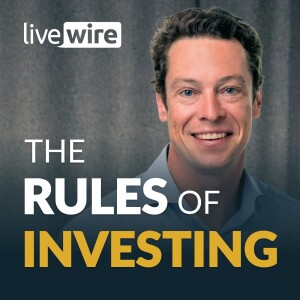
Friday Apr 12, 2024
Friday Apr 12, 2024
Quality growth stocks, those with fortress balance sheets, impressive moats, structural tailwinds and top-notch management teams, have had a stellar run recently. Take Goodman Group (ASX: GMG) for example, which has risen 66% over the past year. Or Megaport (ASX: MP1), up over 252% in 12 months alone.
If you're like this anonymous writer, you've probably started to ponder whether it's time to trim some of your winning positions and take some profits.
And according to TMS Capital's Ben Clark, we may have just reached that point.
"A lot of investors are trying to chase a very small number of stocks in Australia because of the AI trade," he says.
"And I'd just be a bit wary about that because although those companies absolutely should benefit, it's just how quickly those benefits flow through and whether the market has just got a bit ahead of itself in terms of the benefits that will come through in the medium term."
In this episode of The Rules of Investing, Clark sits down with Livewire's Ally Selby for a conversation on all things artificial intelligence, growth investing and holy grail stocks.
He shares where he is putting some of the firm's dry powder to work, a few reasons why investors should feel optimistic about the outlook for markets, and whether he would be buying the AI behemoths both globally and locally today despite their stellar runs over the last six months.
Plus, Clark shares why the tables may be turning once again for out-of-love growth darling CSL (ASX: CSL).
Note: This episode was recorded on Tuesday 9 April 2024.
Timecodes:
0:00 - Intro
1:54 - Ben Clark's outlook for the remainder of 2024
4:17 - Record cash holdings in the US and what this means for markets
6:51 - Why Aussie investors are also holding a lot of cash
7:39 - The most common question Ben Clark is hearing from clients
10:01 - The takeaways from Ben's trip to SXSW in the US
12:13 - Learnings from a private meeting with a Google executive
15:11 - The outlook for Microsoft (NASDAQ: MSFT) and Google (NASDAQ: GOOGL)
16:25 - Can the momentum continue for global AI winners like Nvidia (NASDAQ: NVDA)
19:17 - The ASX-listed stocks that directly benefit from AI
23:17 - Why some of these stocks' share prices may have gotten ahead of themselves
24:30 - Holy grail stocks - and why Brickworks (ASX: BKW), WiseTech (ASX: WTC), REA Group (ASX: REA) and CSL (ASX: CSL) make the cut
29:32 - Where Ben Clark has started to take profits
31:28 - And where he is putting that cash to work
36:11 - One thing the market is getting wrong today
38:03 - Lessons for growth investors from the 2022 bear market
42:59 - A stock to buy and hold for the next five years

Friday Mar 22, 2024
The next 10 years in ETF growth could be dominated by this asset class
Friday Mar 22, 2024
Friday Mar 22, 2024
If there is any one investment product that has experienced a true boom over the last 10 years, it is exchange-traded funds (ETFs) and exchange-traded products (ETPs) more broadly.
The number of listed products has increased by 17.5 times in Australia during the last decade alone. More than 300 products are now listed across the ASX and CBOE exchanges and two million Australians have at least one ETF in their portfolio.
And, as if you need more proof of the growth of ETPs, 2024 marked the first time that inflows outpaced those going into unlisted managed funds.
So if we've seen this growth over the last decade, what could the next 10 years hold?
In this episode of The Rules of Investing, we put this and other questions to Tamara Haban-Beer Stats, Director and ETF/Index Investments Specialist at BlackRock Australia. BlackRock is the world's largest asset manager and its ETF arm iShares runs 49 ETPs in the Australian market.
In this episode, Tamara also discusses the key mega forces that BlackRock believes could drive markets over the long run, where they are overweight in portfolios and the asset classes they believe could see the biggest growth within ETPs over the coming years.
Note: This episode was recorded on Tuesday 19 March 2024.
Timestamps
0:00 - Intro
2:21 - BlackRock's outlook for the next 12 months
4:06 - What the new investing regime means for ETF investors
6:17 - The five "mega forces" of investing
9:13 - Currency impacts on ETF returns
10:27 - Will the Australian Dollar rebound in late 2024?
13:45 - Should investors consider hedged ETFs?
14:55 - Opportunities in Japan and the US
16:47 - Why the AI boom won't be early 2000 all over again
18:02 - The explosion of interest and uptake in ETFs
21:31 - The asset class that could gain the lion's share of growth in the future
23:17 - Other interesting innovations in the global ETF market
25:06 - Which products are seeing the most inflows and outflows in 2024?
27:31 - The Rules of Investing's regular questions (with an ETF twist)

Friday Mar 15, 2024
Friday Mar 15, 2024
Warryn Robertson, portfolio manager and analyst at Lazard Asset management, understands the nuances of infrastructure assets like few others in the market. His approach is to find monopoly assets with inflation protected revenues, high margins and reasonable leverage then buy them at attractive prices.
Of the 400 listed infrastructure stocks globally only 160 have passed the four filters and typically Lazard’s Global Listed Infrastructure Fund will own just 25 to 30 of those companies. Given the attractive nature of infrastructure assets it is unsurprising that sovereign wealth funds and private equity firms are also circling these assets. Robertson estimates that of the 160 stocks that meet his criteria 25 have been taken private and delisted.
The situation in Australia is even more challenging, of the 14 infrastructure and utility stocks on the ASX valued at more than $1 billion just four meet Warren’s criteria as being ‘preferred infrastructure’.
The good news is that Robertson is a firm believer and concentrating your capital into your best ideas. In this episode of the Rules of Investing, Warryn Robertson reviews the recent performance of that asset class through an inflationary environment, explains why US utilities look vulnerable and shares what he believes are the best opportunities in infrastructure.
Robertson also reveals what he regards as the top infrastructure stock on the ASX and an infrastructure company with an absolutely stunning earnings outlook.



